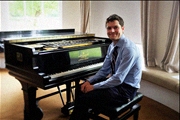Tutor HuntResources Music Theory Resources
Jazz And Classical Cohesion
Can a musical learning be enhanced by learning both Jazz and Classical methods simultaneously
Date : 18/11/2013
Author Information

Uploaded by : Daniel
Uploaded on : 18/11/2013
Subject : Music Theory
So why am I telling you all of this?
During both my undergraduate dissertation and my Masters thesis I was forced to reflect in some detail about my own musical history and where it had left me and others in a similar position. I formed discussion groups, analysed performance classes, taken the occasional workshops, used case studies and gathered more data from literature and online resources. For the research I did not use my own experiences so as to keep results objective.
Without boring you of all of the intricate details of my research, I found that elements of what people perceived as traditionally Jazz education, when immersed into Classical education resulted in huge benefits to morale, anxiety and motivation. Specifically, the incorporation of improvisation techniques, practice and performance. I also found that most of the students I spoke to enjoyed listening to the discipline they were not familiar with (that is Jazz or Classical) and were in huge admiration of one another. Furthermore, those that had intensively studied in a single discipline (most notably Classical piano) were more susceptible to emotional stress and performance anxiety. Others who had even a limited experience either in musical theatre or popular music on top of their classical specialism seemed to enjoy their music more and had a greater sense of freedom during a performance. This of course begs the question: why are Jazz and Classical so apparently disparate?
The answer is very much a subjective one and may vary depending on who the recipient is. My personal feeling is that in today`s music educational culture, particularly in Higher education, there is a reluctance to specialise in more than one area. Any study outside of that one area, such as Classical piano, is considered an unnecessary deterrent with not direct benefit. The latter may be true but from the evidence that I have witnessed, and from the limited amount of literature on this subject, there appears to be a multitude of indirect benefits which are seemingly being ignored.
My intention behind the creation of this article is not to try and convince the reader that music education is wrong in any way. There are many successes in its current state. My only concern is that it is not as inclusive as it could be, particularly in Classical education, which may be a limiting factor. The incorporation of multi-disciplinary pedagogy may not be the answer but I believe it is worth a try and where better to start than in private lessons.
This resource was uploaded by: Daniel
